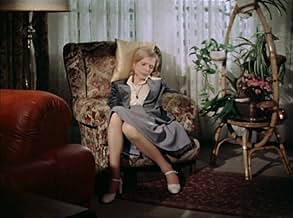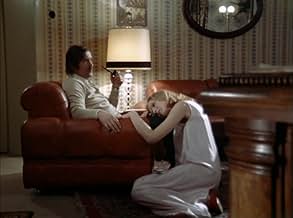Margit Carstensen plays the lead, Margot, a woman who is what the early 20th century doctors would have used as a dictionary definition of "hysterical". Indeed, at one point early in the film (albeit referring to her soon-to-be baby she'll give birth to) she says that she's hysterical, in a manner that is true but with the voice of something else. Throughout Fear of Fear her character fluctuates from various self-inflicted ailments, and the simple macho "Guy" thing would be to just slap her and get on with the day. But that's not at all the way of Margot's husband, Kurt, would ever operate. In fact he is just what every woman would want in a man, husband, father, all of the above: caring, considerate, supportive, but at the same time studying for some math exam and not able to give undivided attention to her. The spiral downward continues for her with Valium, booze, an on-off bond with her five year old daughter, and worst of all her nosy mother and sister in laws living one floor up.
This is top-shelf Fassbinder. It's somewhat cheap with its budget because it is a TV movie that, frankly, is obscure due in some small part to the director probably making it so quickly he didn't want to bother going through all the motions of releasing it in theaters. But a full-length movie it is, and a superb one, a scorching-hot melodrama that finds the fragility of this character, the truth and liabilities with this volatile, beautiful force, but never going too far into horrid melodrama. Anyone else could make a respectable Saturday afternoon Lifetime movie (all of the ingredients essentially are there). Fassbinder isn't into just telling a story of a kind of neglected woman who can't control her mind. It's also an important message put forward, first off, about the possible problems psychologically for a woman to give birth (post-partem depression, which is very real), and that it's not just hysterics or fodder for gossip.
There's a lot of depth here, and not just in stuff like the recurring presence of the character Bauer, a mysterious guy who keeps standing outside of the apartment building, seeing Margot going to the doctor's office, leering, creepy in his own way but nearly ghost-like. That is the kind of touch that keeps things just so strange enough that it doesn't become clichéd, and around something as symbolic as the character Bauer he piles up the drama: the mother (Brigitte Mira in a perfect two-dimensional turn) and the sister of Kurt as the watchdogs of the whole unraveling, the doctor who has an affair with the wayward Margot, the total love for her child that gets twisted in the lack of logic and restraint. And finally Margot herself, played by Carstensen like it should be the performance of her career- which just for television is truly remarkable- achieving a slight Catherine Deneuve quality only, frankly, deeper in places to draw from emotionally.
Newcoming fans of the director's obscenely big body of work (like myself) would do well to check out this little-known treat of a 'woman under the influence' drama that rises way above most of its conventions or, if not always, enough to keep things fascinating.




























